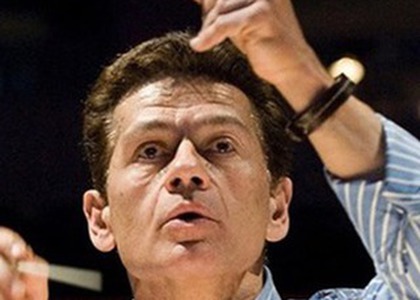> [Archived] Interviews

Interview with conductor Christian Badea
Tomorrow, May 13th, a Royal Concert will take place on the stage of the Radio Hall, during which the cellist Andrei Ioniță will perform along with the National Radio Orchestra, under the baton of Christian Badea. We are learning more about this event from the conductor of the evening, in an interview done by Petre Fugaciu:
The rehearsals were good. The program is somehow familiar because we have the VIII masterpiece by Dvorak, which is played quite often, but there are always different approaches. I probably play it differently, I asked them for further details and many nuances and the orchestra understood what was needed and arranged them very quickly. I don't know how they did it. At first, it didn't work out perfectly, of course, because it was the first rehearsal, but very, very quickly, things started to change, to get better. So it was very enjoyable.
In April you collaborated with the violinist Ioana Cristina Goicea, you go on stage with Andrei Ioniță this month. How do you see this new generation of Romanian artists?
I see it as happy as possible and my heart is growing. Why? Because I've known them since they were very, very young. I think I first listened to Ioana when she was 16 and I have known Andrei very well since he was just 18, because that's when I created my foundation, the Romanian Foundation for Excellence in Music, a foundation that I thought as a support, support for young Romanian and foreign musicians. So, at one point I did a festival in Sibiu where I brough tmostly young Romanian musicians, but some also came from eight different countries.
It was a very nice experience. Andrei Ioniță was one of the first to come to the foundation, he performed in the orchestra, but he also sang chamber music with others, which developed very well under the guidance of Remus Azoiței, who is not only an exceptional musician, but he is also a very, very good teacher and mentor, because he worked well with them, encouraged them, took care of them, so they felt very, very good, even if they felt anxious at first. They performed Mendelssohn's byte at the Athenaeum, which sounded great, and then of course I watched Andrei, who evolved very quickly and reached that memorable moment in 2015 when he went to St. Petersburg and then to Moscow for the Tchaikovsky contest. Nobody or very few knew him, in any case, as he was very young back then.
I was in Australia, in Sydney, I wa sdirecting the opera in Sydney, the chance was that the contest was streamed live when I had no rehearsals. So I didn't get much sleep. I watched him and others I knew. Interestingly enough, it was a competition with a competitive spirit. Andrei sang absolutely fantastic. After the second stage, I am recalling, he performed Shostakovich's Sonata and at the end, there was a wave of applause, success and so on. It was exceptional and the television camera made such a lateral, transversal plan, I don't know what it's called on the whole jury table, on the members of the jury. They were all gaping. I've never seen anything like that. And these were famous celestials. He impressed them as much as possible. And then I sent a message to Andrei and said: Andrei, you won the contest. And so it was.
Translated by Roberta Ana-Maria Gulerez,
University of Bucharest, Faculty of Foreign Languages and Literatures, MTTLC, year I
Corrected by Silvia Petrescu














